Unit 12: Organisational Behaviour
VerifiedAdded on 2023/01/12
|17
|5145
|42
AI Summary
Contribute Materials
Your contribution can guide someone’s learning journey. Share your
documents today.
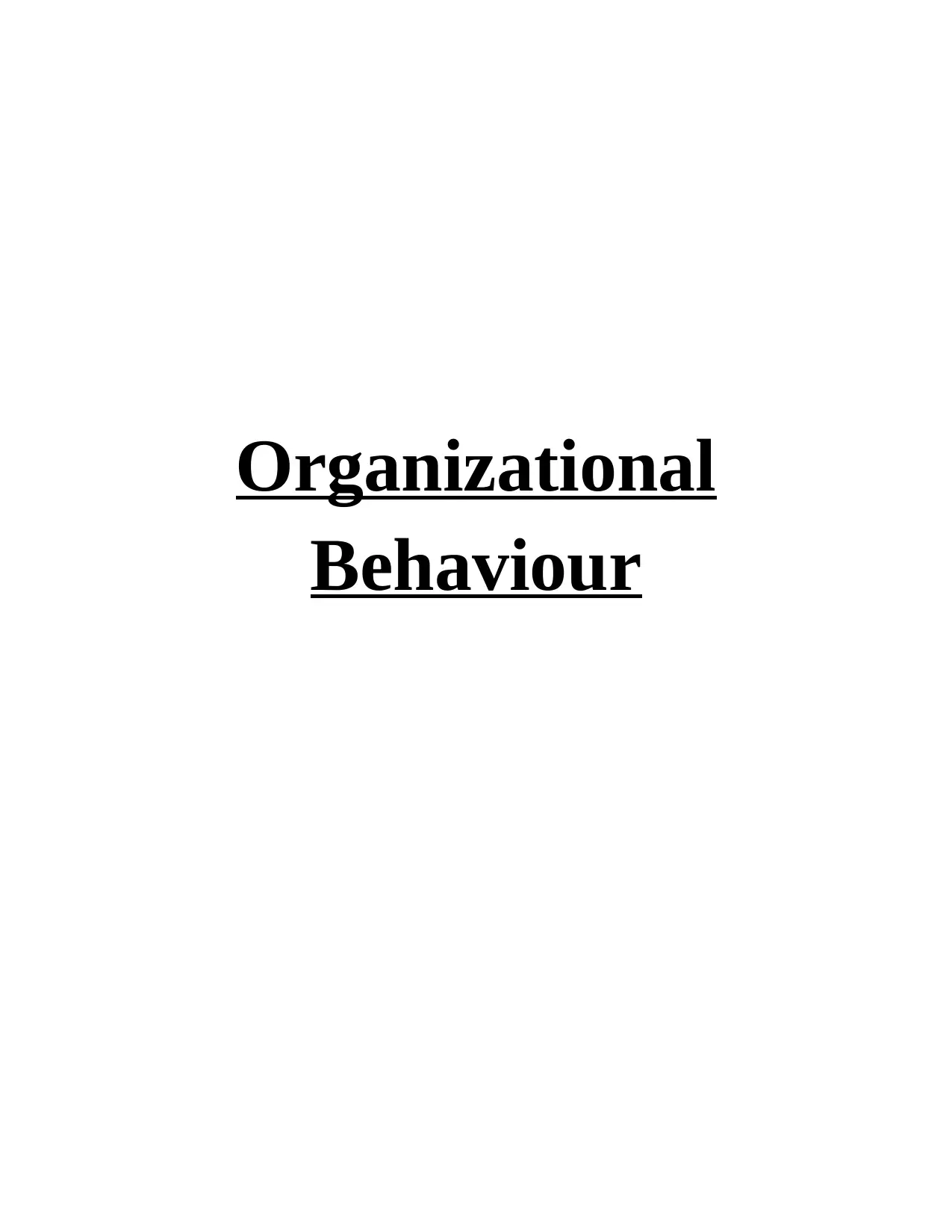
Organizational
Behaviour
Behaviour
Secure Best Marks with AI Grader
Need help grading? Try our AI Grader for instant feedback on your assignments.
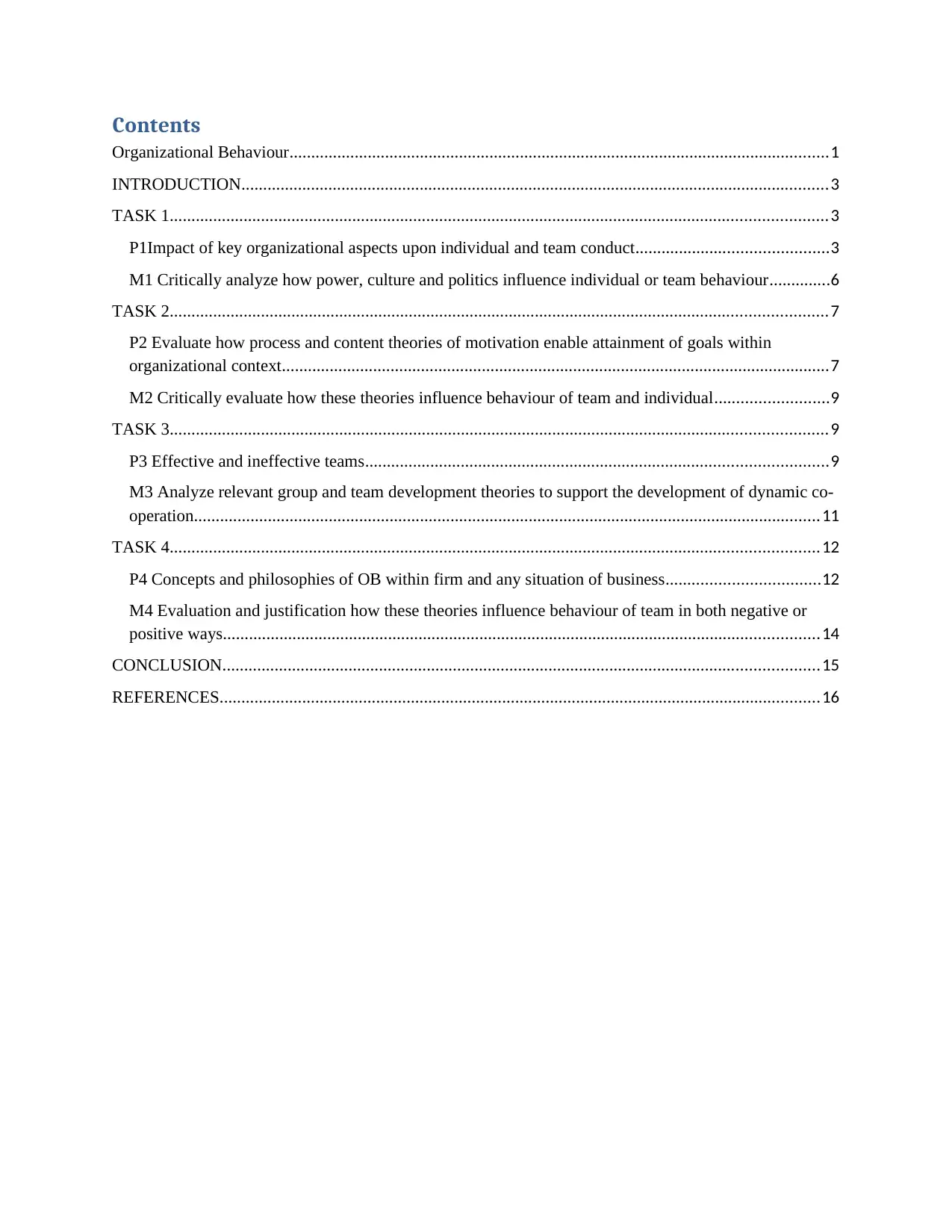
Contents
Organizational Behaviour............................................................................................................................1
INTRODUCTION.......................................................................................................................................3
TASK 1.......................................................................................................................................................3
P1Impact of key organizational aspects upon individual and team conduct............................................3
M1 Critically analyze how power, culture and politics influence individual or team behaviour..............6
TASK 2.......................................................................................................................................................7
P2 Evaluate how process and content theories of motivation enable attainment of goals within
organizational context..............................................................................................................................7
M2 Critically evaluate how these theories influence behaviour of team and individual..........................9
TASK 3.......................................................................................................................................................9
P3 Effective and ineffective teams..........................................................................................................9
M3 Analyze relevant group and team development theories to support the development of dynamic co-
operation................................................................................................................................................11
TASK 4.....................................................................................................................................................12
P4 Concepts and philosophies of OB within firm and any situation of business...................................12
M4 Evaluation and justification how these theories influence behaviour of team in both negative or
positive ways.........................................................................................................................................14
CONCLUSION.........................................................................................................................................15
REFERENCES..........................................................................................................................................16
Organizational Behaviour............................................................................................................................1
INTRODUCTION.......................................................................................................................................3
TASK 1.......................................................................................................................................................3
P1Impact of key organizational aspects upon individual and team conduct............................................3
M1 Critically analyze how power, culture and politics influence individual or team behaviour..............6
TASK 2.......................................................................................................................................................7
P2 Evaluate how process and content theories of motivation enable attainment of goals within
organizational context..............................................................................................................................7
M2 Critically evaluate how these theories influence behaviour of team and individual..........................9
TASK 3.......................................................................................................................................................9
P3 Effective and ineffective teams..........................................................................................................9
M3 Analyze relevant group and team development theories to support the development of dynamic co-
operation................................................................................................................................................11
TASK 4.....................................................................................................................................................12
P4 Concepts and philosophies of OB within firm and any situation of business...................................12
M4 Evaluation and justification how these theories influence behaviour of team in both negative or
positive ways.........................................................................................................................................14
CONCLUSION.........................................................................................................................................15
REFERENCES..........................................................................................................................................16
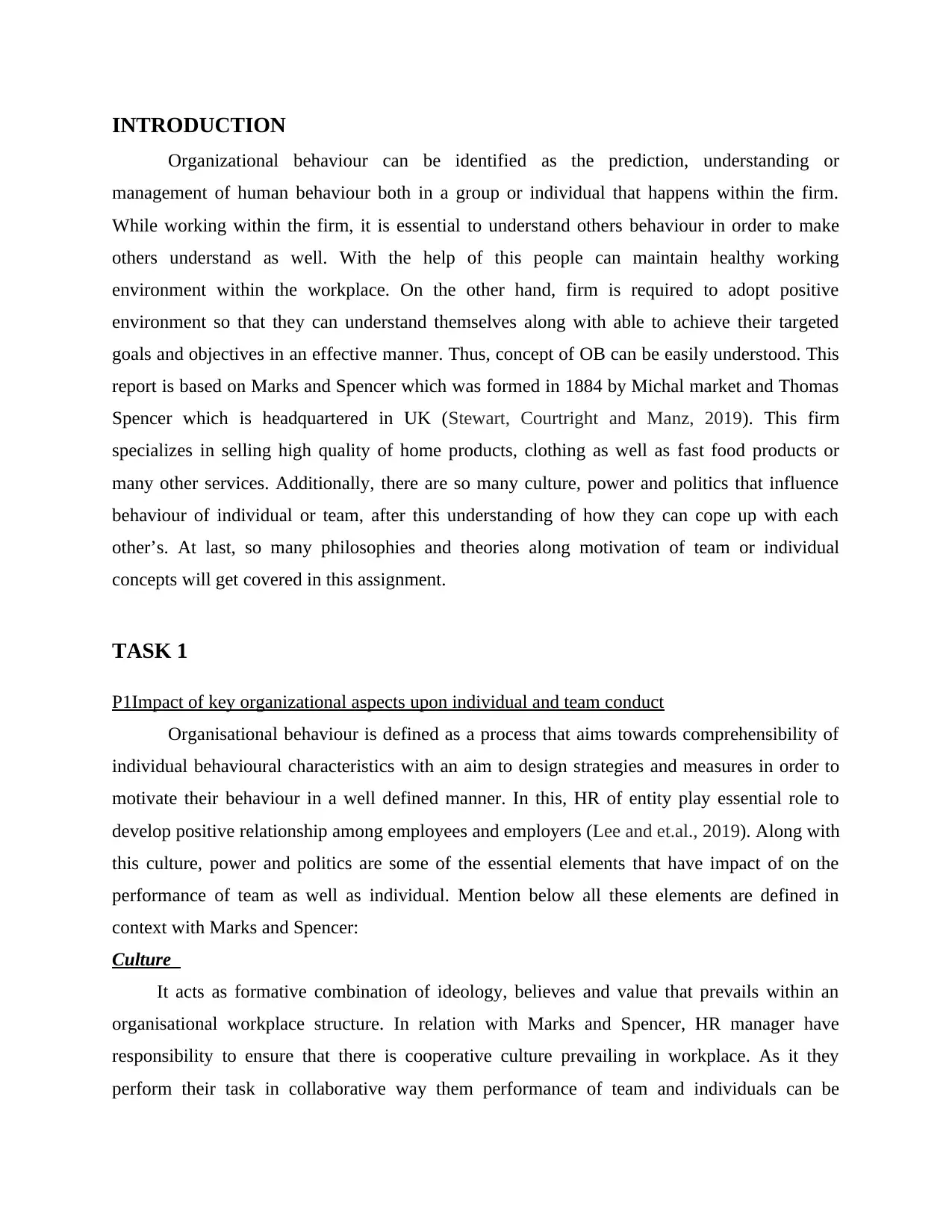
INTRODUCTION
Organizational behaviour can be identified as the prediction, understanding or
management of human behaviour both in a group or individual that happens within the firm.
While working within the firm, it is essential to understand others behaviour in order to make
others understand as well. With the help of this people can maintain healthy working
environment within the workplace. On the other hand, firm is required to adopt positive
environment so that they can understand themselves along with able to achieve their targeted
goals and objectives in an effective manner. Thus, concept of OB can be easily understood. This
report is based on Marks and Spencer which was formed in 1884 by Michal market and Thomas
Spencer which is headquartered in UK (Stewart, Courtright and Manz, 2019). This firm
specializes in selling high quality of home products, clothing as well as fast food products or
many other services. Additionally, there are so many culture, power and politics that influence
behaviour of individual or team, after this understanding of how they can cope up with each
other’s. At last, so many philosophies and theories along motivation of team or individual
concepts will get covered in this assignment.
TASK 1
P1Impact of key organizational aspects upon individual and team conduct
Organisational behaviour is defined as a process that aims towards comprehensibility of
individual behavioural characteristics with an aim to design strategies and measures in order to
motivate their behaviour in a well defined manner. In this, HR of entity play essential role to
develop positive relationship among employees and employers (Lee and et.al., 2019). Along with
this culture, power and politics are some of the essential elements that have impact of on the
performance of team as well as individual. Mention below all these elements are defined in
context with Marks and Spencer:
Culture
It acts as formative combination of ideology, believes and value that prevails within an
organisational workplace structure. In relation with Marks and Spencer, HR manager have
responsibility to ensure that there is cooperative culture prevailing in workplace. As it they
perform their task in collaborative way them performance of team and individuals can be
Organizational behaviour can be identified as the prediction, understanding or
management of human behaviour both in a group or individual that happens within the firm.
While working within the firm, it is essential to understand others behaviour in order to make
others understand as well. With the help of this people can maintain healthy working
environment within the workplace. On the other hand, firm is required to adopt positive
environment so that they can understand themselves along with able to achieve their targeted
goals and objectives in an effective manner. Thus, concept of OB can be easily understood. This
report is based on Marks and Spencer which was formed in 1884 by Michal market and Thomas
Spencer which is headquartered in UK (Stewart, Courtright and Manz, 2019). This firm
specializes in selling high quality of home products, clothing as well as fast food products or
many other services. Additionally, there are so many culture, power and politics that influence
behaviour of individual or team, after this understanding of how they can cope up with each
other’s. At last, so many philosophies and theories along motivation of team or individual
concepts will get covered in this assignment.
TASK 1
P1Impact of key organizational aspects upon individual and team conduct
Organisational behaviour is defined as a process that aims towards comprehensibility of
individual behavioural characteristics with an aim to design strategies and measures in order to
motivate their behaviour in a well defined manner. In this, HR of entity play essential role to
develop positive relationship among employees and employers (Lee and et.al., 2019). Along with
this culture, power and politics are some of the essential elements that have impact of on the
performance of team as well as individual. Mention below all these elements are defined in
context with Marks and Spencer:
Culture
It acts as formative combination of ideology, believes and value that prevails within an
organisational workplace structure. In relation with Marks and Spencer, HR manager have
responsibility to ensure that there is cooperative culture prevailing in workplace. As it they
perform their task in collaborative way them performance of team and individuals can be
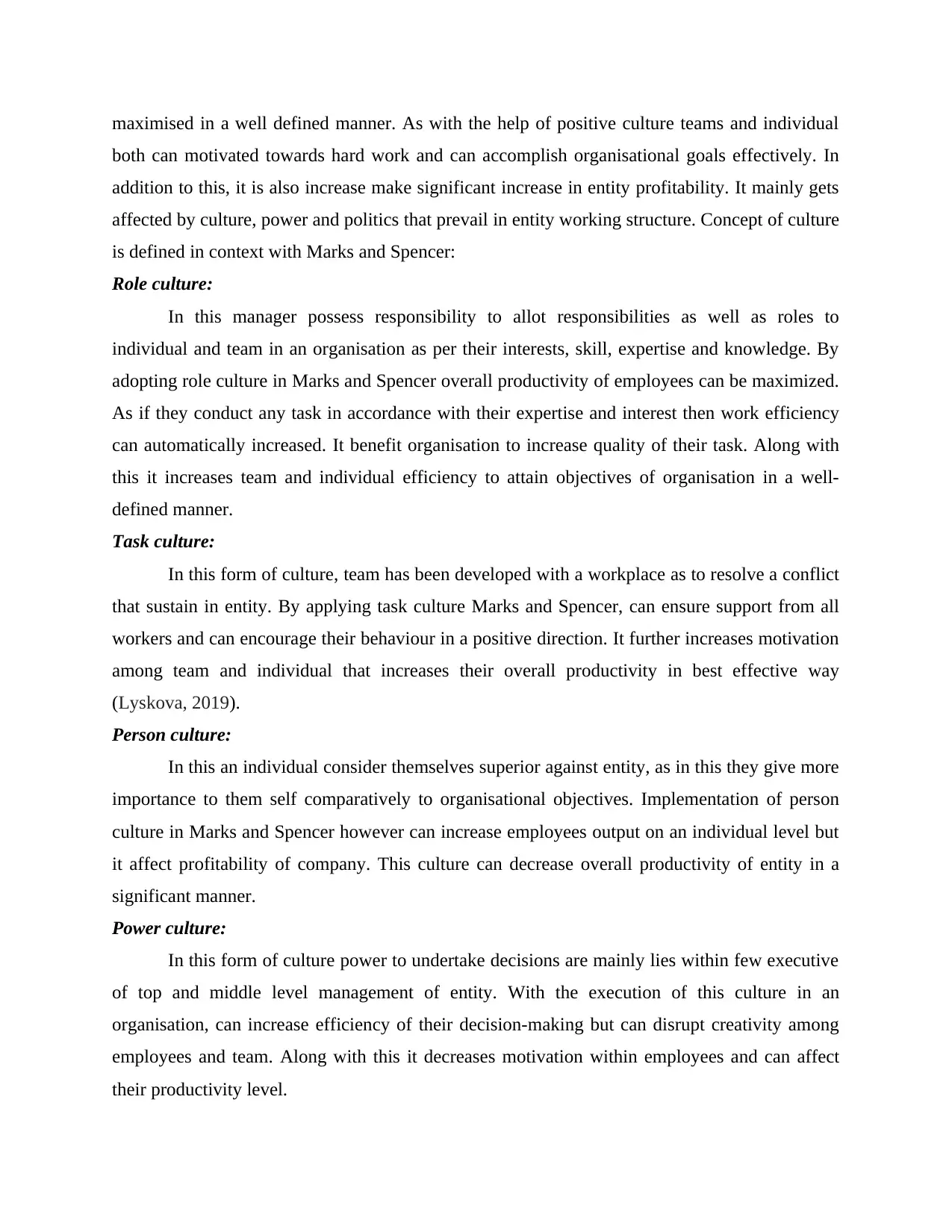
maximised in a well defined manner. As with the help of positive culture teams and individual
both can motivated towards hard work and can accomplish organisational goals effectively. In
addition to this, it is also increase make significant increase in entity profitability. It mainly gets
affected by culture, power and politics that prevail in entity working structure. Concept of culture
is defined in context with Marks and Spencer:
Role culture:
In this manager possess responsibility to allot responsibilities as well as roles to
individual and team in an organisation as per their interests, skill, expertise and knowledge. By
adopting role culture in Marks and Spencer overall productivity of employees can be maximized.
As if they conduct any task in accordance with their expertise and interest then work efficiency
can automatically increased. It benefit organisation to increase quality of their task. Along with
this it increases team and individual efficiency to attain objectives of organisation in a well-
defined manner.
Task culture:
In this form of culture, team has been developed with a workplace as to resolve a conflict
that sustain in entity. By applying task culture Marks and Spencer, can ensure support from all
workers and can encourage their behaviour in a positive direction. It further increases motivation
among team and individual that increases their overall productivity in best effective way
(Lyskova, 2019).
Person culture:
In this an individual consider themselves superior against entity, as in this they give more
importance to them self comparatively to organisational objectives. Implementation of person
culture in Marks and Spencer however can increase employees output on an individual level but
it affect profitability of company. This culture can decrease overall productivity of entity in a
significant manner.
Power culture:
In this form of culture power to undertake decisions are mainly lies within few executive
of top and middle level management of entity. With the execution of this culture in an
organisation, can increase efficiency of their decision-making but can disrupt creativity among
employees and team. Along with this it decreases motivation within employees and can affect
their productivity level.
both can motivated towards hard work and can accomplish organisational goals effectively. In
addition to this, it is also increase make significant increase in entity profitability. It mainly gets
affected by culture, power and politics that prevail in entity working structure. Concept of culture
is defined in context with Marks and Spencer:
Role culture:
In this manager possess responsibility to allot responsibilities as well as roles to
individual and team in an organisation as per their interests, skill, expertise and knowledge. By
adopting role culture in Marks and Spencer overall productivity of employees can be maximized.
As if they conduct any task in accordance with their expertise and interest then work efficiency
can automatically increased. It benefit organisation to increase quality of their task. Along with
this it increases team and individual efficiency to attain objectives of organisation in a well-
defined manner.
Task culture:
In this form of culture, team has been developed with a workplace as to resolve a conflict
that sustain in entity. By applying task culture Marks and Spencer, can ensure support from all
workers and can encourage their behaviour in a positive direction. It further increases motivation
among team and individual that increases their overall productivity in best effective way
(Lyskova, 2019).
Person culture:
In this an individual consider themselves superior against entity, as in this they give more
importance to them self comparatively to organisational objectives. Implementation of person
culture in Marks and Spencer however can increase employees output on an individual level but
it affect profitability of company. This culture can decrease overall productivity of entity in a
significant manner.
Power culture:
In this form of culture power to undertake decisions are mainly lies within few executive
of top and middle level management of entity. With the execution of this culture in an
organisation, can increase efficiency of their decision-making but can disrupt creativity among
employees and team. Along with this it decreases motivation within employees and can affect
their productivity level.
Secure Best Marks with AI Grader
Need help grading? Try our AI Grader for instant feedback on your assignments.
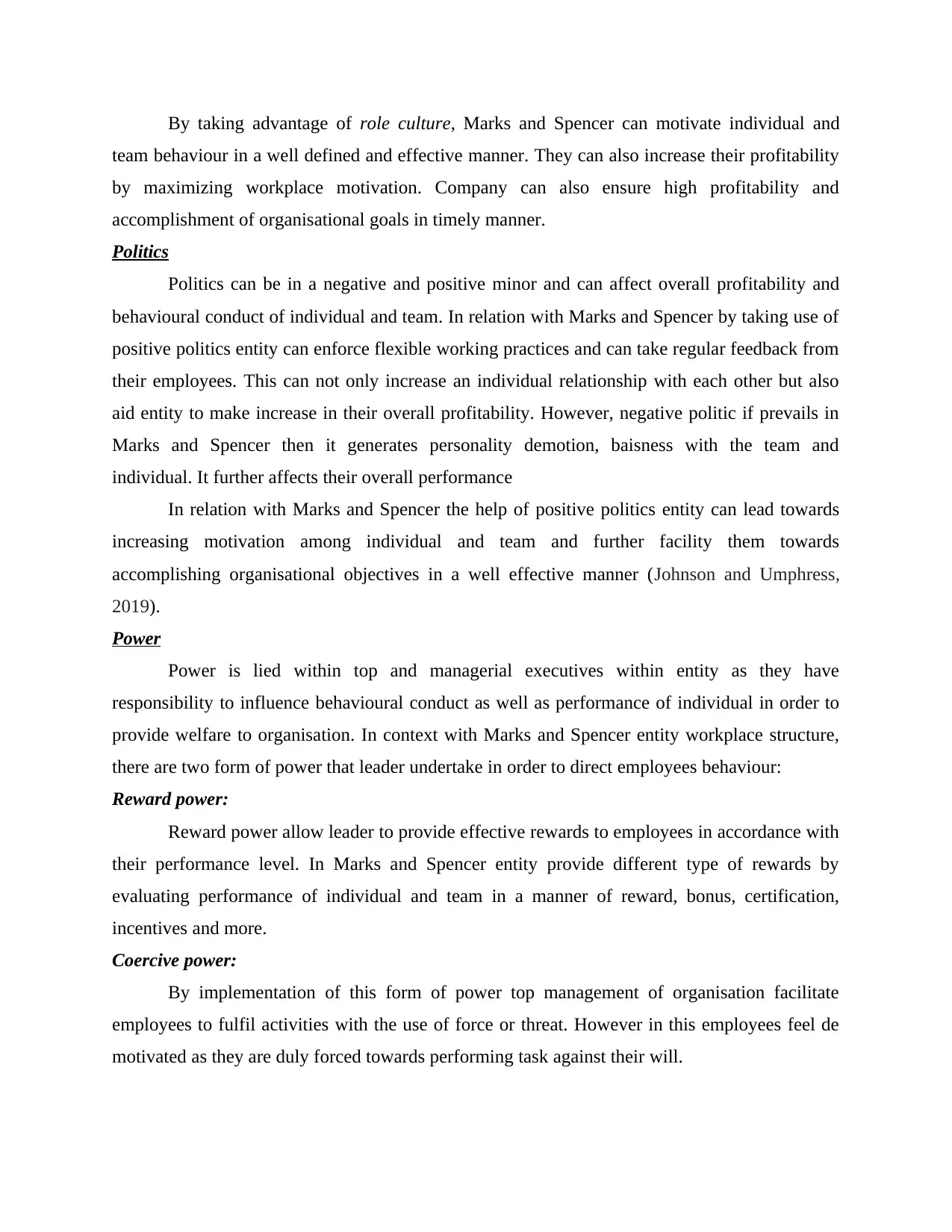
By taking advantage of role culture, Marks and Spencer can motivate individual and
team behaviour in a well defined and effective manner. They can also increase their profitability
by maximizing workplace motivation. Company can also ensure high profitability and
accomplishment of organisational goals in timely manner.
Politics
Politics can be in a negative and positive minor and can affect overall profitability and
behavioural conduct of individual and team. In relation with Marks and Spencer by taking use of
positive politics entity can enforce flexible working practices and can take regular feedback from
their employees. This can not only increase an individual relationship with each other but also
aid entity to make increase in their overall profitability. However, negative politic if prevails in
Marks and Spencer then it generates personality demotion, baisness with the team and
individual. It further affects their overall performance
In relation with Marks and Spencer the help of positive politics entity can lead towards
increasing motivation among individual and team and further facility them towards
accomplishing organisational objectives in a well effective manner (Johnson and Umphress,
2019).
Power
Power is lied within top and managerial executives within entity as they have
responsibility to influence behavioural conduct as well as performance of individual in order to
provide welfare to organisation. In context with Marks and Spencer entity workplace structure,
there are two form of power that leader undertake in order to direct employees behaviour:
Reward power:
Reward power allow leader to provide effective rewards to employees in accordance with
their performance level. In Marks and Spencer entity provide different type of rewards by
evaluating performance of individual and team in a manner of reward, bonus, certification,
incentives and more.
Coercive power:
By implementation of this form of power top management of organisation facilitate
employees to fulfil activities with the use of force or threat. However in this employees feel de
motivated as they are duly forced towards performing task against their will.
team behaviour in a well defined and effective manner. They can also increase their profitability
by maximizing workplace motivation. Company can also ensure high profitability and
accomplishment of organisational goals in timely manner.
Politics
Politics can be in a negative and positive minor and can affect overall profitability and
behavioural conduct of individual and team. In relation with Marks and Spencer by taking use of
positive politics entity can enforce flexible working practices and can take regular feedback from
their employees. This can not only increase an individual relationship with each other but also
aid entity to make increase in their overall profitability. However, negative politic if prevails in
Marks and Spencer then it generates personality demotion, baisness with the team and
individual. It further affects their overall performance
In relation with Marks and Spencer the help of positive politics entity can lead towards
increasing motivation among individual and team and further facility them towards
accomplishing organisational objectives in a well effective manner (Johnson and Umphress,
2019).
Power
Power is lied within top and managerial executives within entity as they have
responsibility to influence behavioural conduct as well as performance of individual in order to
provide welfare to organisation. In context with Marks and Spencer entity workplace structure,
there are two form of power that leader undertake in order to direct employees behaviour:
Reward power:
Reward power allow leader to provide effective rewards to employees in accordance with
their performance level. In Marks and Spencer entity provide different type of rewards by
evaluating performance of individual and team in a manner of reward, bonus, certification,
incentives and more.
Coercive power:
By implementation of this form of power top management of organisation facilitate
employees to fulfil activities with the use of force or threat. However in this employees feel de
motivated as they are duly forced towards performing task against their will.
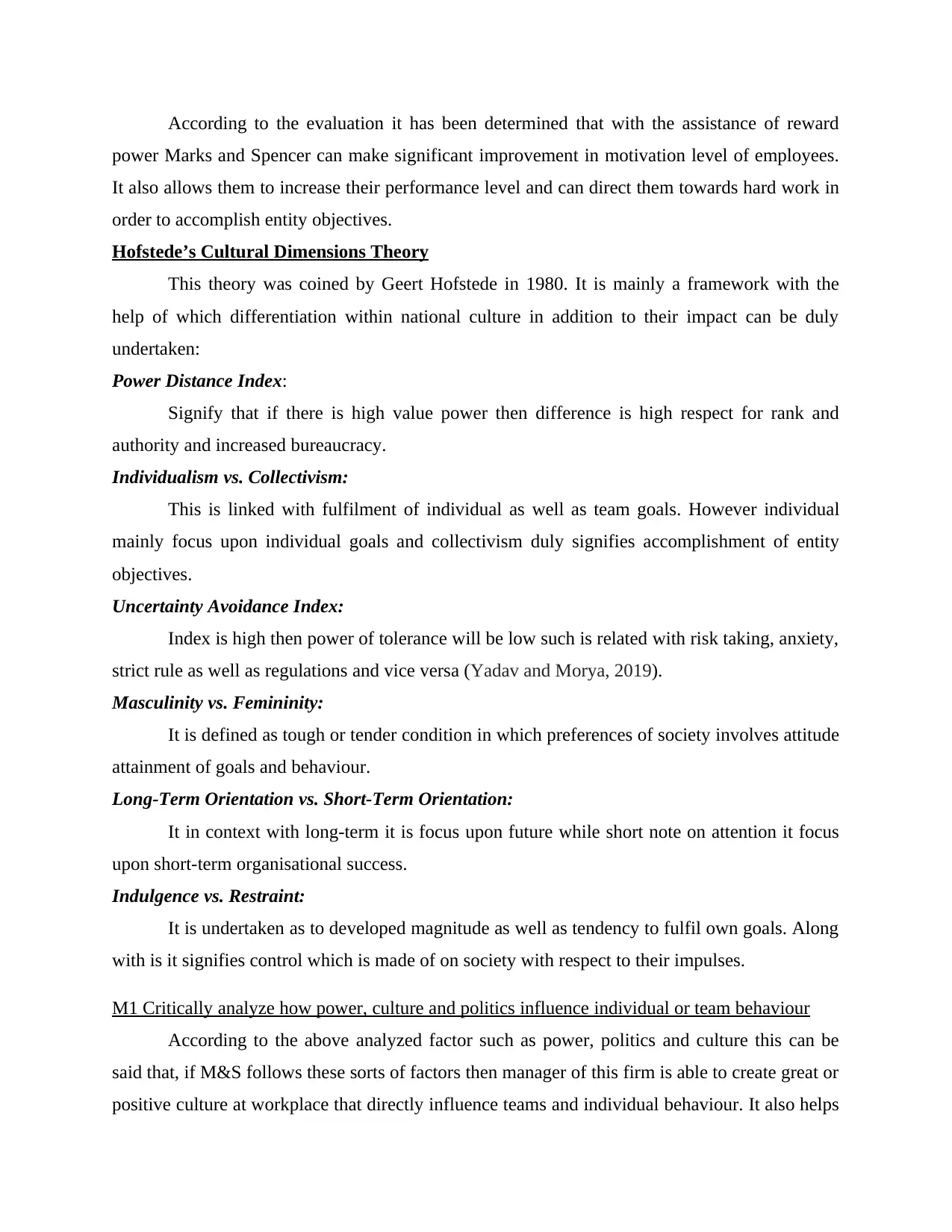
According to the evaluation it has been determined that with the assistance of reward
power Marks and Spencer can make significant improvement in motivation level of employees.
It also allows them to increase their performance level and can direct them towards hard work in
order to accomplish entity objectives.
Hofstede’s Cultural Dimensions Theory
This theory was coined by Geert Hofstede in 1980. It is mainly a framework with the
help of which differentiation within national culture in addition to their impact can be duly
undertaken:
Power Distance Index:
Signify that if there is high value power then difference is high respect for rank and
authority and increased bureaucracy.
Individualism vs. Collectivism:
This is linked with fulfilment of individual as well as team goals. However individual
mainly focus upon individual goals and collectivism duly signifies accomplishment of entity
objectives.
Uncertainty Avoidance Index:
Index is high then power of tolerance will be low such is related with risk taking, anxiety,
strict rule as well as regulations and vice versa (Yadav and Morya, 2019).
Masculinity vs. Femininity:
It is defined as tough or tender condition in which preferences of society involves attitude
attainment of goals and behaviour.
Long-Term Orientation vs. Short-Term Orientation:
It in context with long-term it is focus upon future while short note on attention it focus
upon short-term organisational success.
Indulgence vs. Restraint:
It is undertaken as to developed magnitude as well as tendency to fulfil own goals. Along
with is it signifies control which is made of on society with respect to their impulses.
M1 Critically analyze how power, culture and politics influence individual or team behaviour
According to the above analyzed factor such as power, politics and culture this can be
said that, if M&S follows these sorts of factors then manager of this firm is able to create great or
positive culture at workplace that directly influence teams and individual behaviour. It also helps
power Marks and Spencer can make significant improvement in motivation level of employees.
It also allows them to increase their performance level and can direct them towards hard work in
order to accomplish entity objectives.
Hofstede’s Cultural Dimensions Theory
This theory was coined by Geert Hofstede in 1980. It is mainly a framework with the
help of which differentiation within national culture in addition to their impact can be duly
undertaken:
Power Distance Index:
Signify that if there is high value power then difference is high respect for rank and
authority and increased bureaucracy.
Individualism vs. Collectivism:
This is linked with fulfilment of individual as well as team goals. However individual
mainly focus upon individual goals and collectivism duly signifies accomplishment of entity
objectives.
Uncertainty Avoidance Index:
Index is high then power of tolerance will be low such is related with risk taking, anxiety,
strict rule as well as regulations and vice versa (Yadav and Morya, 2019).
Masculinity vs. Femininity:
It is defined as tough or tender condition in which preferences of society involves attitude
attainment of goals and behaviour.
Long-Term Orientation vs. Short-Term Orientation:
It in context with long-term it is focus upon future while short note on attention it focus
upon short-term organisational success.
Indulgence vs. Restraint:
It is undertaken as to developed magnitude as well as tendency to fulfil own goals. Along
with is it signifies control which is made of on society with respect to their impulses.
M1 Critically analyze how power, culture and politics influence individual or team behaviour
According to the above analyzed factor such as power, politics and culture this can be
said that, if M&S follows these sorts of factors then manager of this firm is able to create great or
positive culture at workplace that directly influence teams and individual behaviour. It also helps
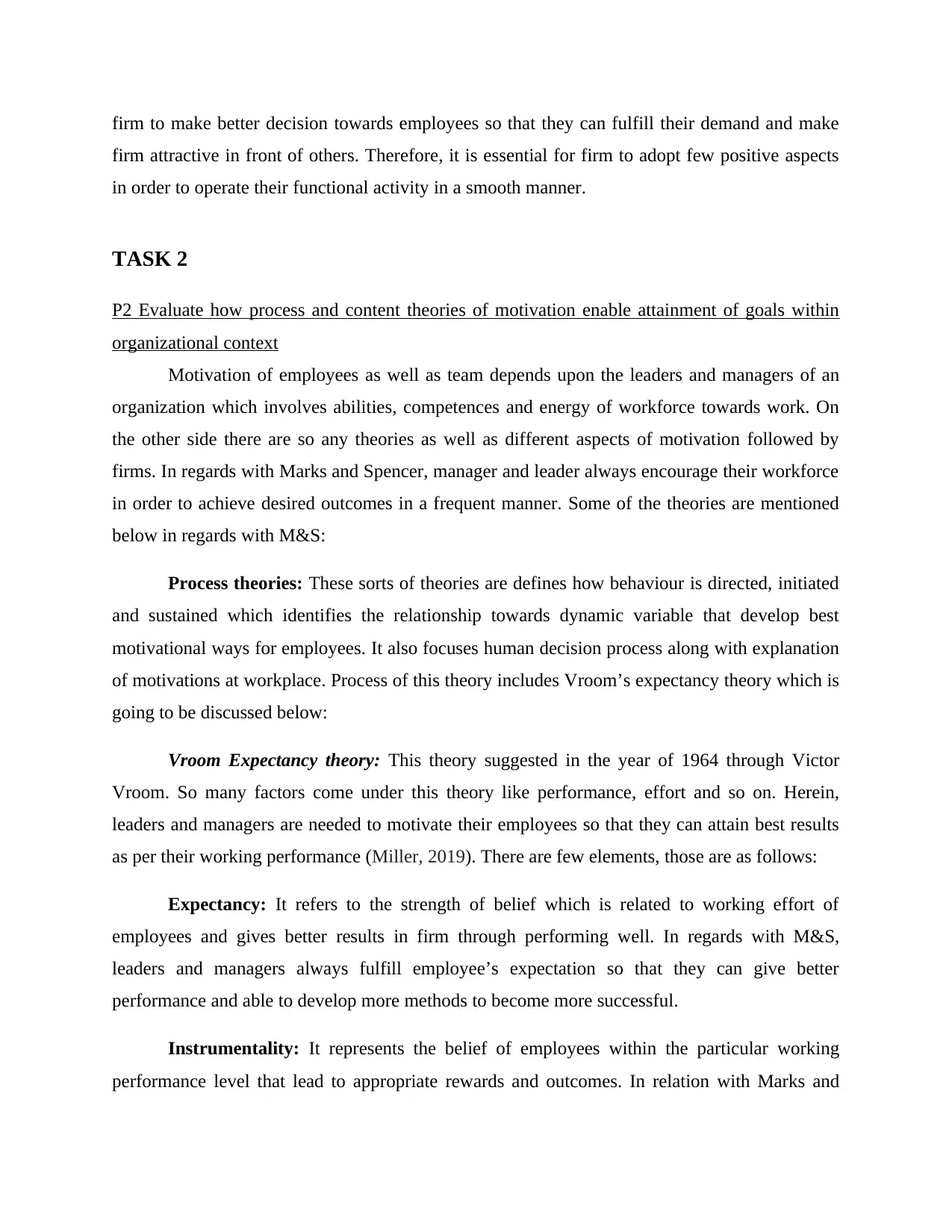
firm to make better decision towards employees so that they can fulfill their demand and make
firm attractive in front of others. Therefore, it is essential for firm to adopt few positive aspects
in order to operate their functional activity in a smooth manner.
TASK 2
P2 Evaluate how process and content theories of motivation enable attainment of goals within
organizational context
Motivation of employees as well as team depends upon the leaders and managers of an
organization which involves abilities, competences and energy of workforce towards work. On
the other side there are so any theories as well as different aspects of motivation followed by
firms. In regards with Marks and Spencer, manager and leader always encourage their workforce
in order to achieve desired outcomes in a frequent manner. Some of the theories are mentioned
below in regards with M&S:
Process theories: These sorts of theories are defines how behaviour is directed, initiated
and sustained which identifies the relationship towards dynamic variable that develop best
motivational ways for employees. It also focuses human decision process along with explanation
of motivations at workplace. Process of this theory includes Vroom’s expectancy theory which is
going to be discussed below:
Vroom Expectancy theory: This theory suggested in the year of 1964 through Victor
Vroom. So many factors come under this theory like performance, effort and so on. Herein,
leaders and managers are needed to motivate their employees so that they can attain best results
as per their working performance (Miller, 2019). There are few elements, those are as follows:
Expectancy: It refers to the strength of belief which is related to working effort of
employees and gives better results in firm through performing well. In regards with M&S,
leaders and managers always fulfill employee’s expectation so that they can give better
performance and able to develop more methods to become more successful.
Instrumentality: It represents the belief of employees within the particular working
performance level that lead to appropriate rewards and outcomes. In relation with Marks and
firm attractive in front of others. Therefore, it is essential for firm to adopt few positive aspects
in order to operate their functional activity in a smooth manner.
TASK 2
P2 Evaluate how process and content theories of motivation enable attainment of goals within
organizational context
Motivation of employees as well as team depends upon the leaders and managers of an
organization which involves abilities, competences and energy of workforce towards work. On
the other side there are so any theories as well as different aspects of motivation followed by
firms. In regards with Marks and Spencer, manager and leader always encourage their workforce
in order to achieve desired outcomes in a frequent manner. Some of the theories are mentioned
below in regards with M&S:
Process theories: These sorts of theories are defines how behaviour is directed, initiated
and sustained which identifies the relationship towards dynamic variable that develop best
motivational ways for employees. It also focuses human decision process along with explanation
of motivations at workplace. Process of this theory includes Vroom’s expectancy theory which is
going to be discussed below:
Vroom Expectancy theory: This theory suggested in the year of 1964 through Victor
Vroom. So many factors come under this theory like performance, effort and so on. Herein,
leaders and managers are needed to motivate their employees so that they can attain best results
as per their working performance (Miller, 2019). There are few elements, those are as follows:
Expectancy: It refers to the strength of belief which is related to working effort of
employees and gives better results in firm through performing well. In regards with M&S,
leaders and managers always fulfill employee’s expectation so that they can give better
performance and able to develop more methods to become more successful.
Instrumentality: It represents the belief of employees within the particular working
performance level that lead to appropriate rewards and outcomes. In relation with Marks and
Paraphrase This Document
Need a fresh take? Get an instant paraphrase of this document with our AI Paraphraser
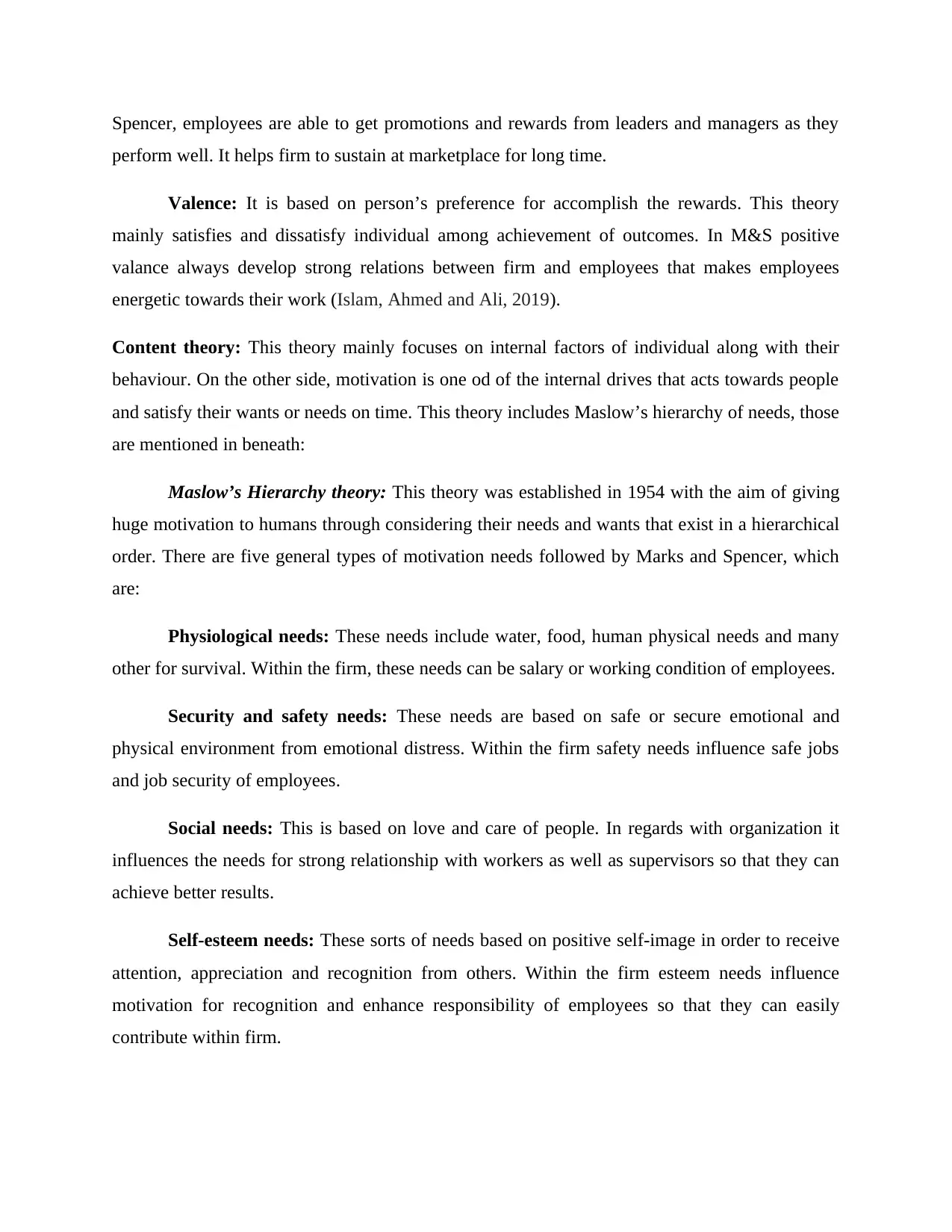
Spencer, employees are able to get promotions and rewards from leaders and managers as they
perform well. It helps firm to sustain at marketplace for long time.
Valence: It is based on person’s preference for accomplish the rewards. This theory
mainly satisfies and dissatisfy individual among achievement of outcomes. In M&S positive
valance always develop strong relations between firm and employees that makes employees
energetic towards their work (Islam, Ahmed and Ali, 2019).
Content theory: This theory mainly focuses on internal factors of individual along with their
behaviour. On the other side, motivation is one od of the internal drives that acts towards people
and satisfy their wants or needs on time. This theory includes Maslow’s hierarchy of needs, those
are mentioned in beneath:
Maslow’s Hierarchy theory: This theory was established in 1954 with the aim of giving
huge motivation to humans through considering their needs and wants that exist in a hierarchical
order. There are five general types of motivation needs followed by Marks and Spencer, which
are:
Physiological needs: These needs include water, food, human physical needs and many
other for survival. Within the firm, these needs can be salary or working condition of employees.
Security and safety needs: These needs are based on safe or secure emotional and
physical environment from emotional distress. Within the firm safety needs influence safe jobs
and job security of employees.
Social needs: This is based on love and care of people. In regards with organization it
influences the needs for strong relationship with workers as well as supervisors so that they can
achieve better results.
Self-esteem needs: These sorts of needs based on positive self-image in order to receive
attention, appreciation and recognition from others. Within the firm esteem needs influence
motivation for recognition and enhance responsibility of employees so that they can easily
contribute within firm.
perform well. It helps firm to sustain at marketplace for long time.
Valence: It is based on person’s preference for accomplish the rewards. This theory
mainly satisfies and dissatisfy individual among achievement of outcomes. In M&S positive
valance always develop strong relations between firm and employees that makes employees
energetic towards their work (Islam, Ahmed and Ali, 2019).
Content theory: This theory mainly focuses on internal factors of individual along with their
behaviour. On the other side, motivation is one od of the internal drives that acts towards people
and satisfy their wants or needs on time. This theory includes Maslow’s hierarchy of needs, those
are mentioned in beneath:
Maslow’s Hierarchy theory: This theory was established in 1954 with the aim of giving
huge motivation to humans through considering their needs and wants that exist in a hierarchical
order. There are five general types of motivation needs followed by Marks and Spencer, which
are:
Physiological needs: These needs include water, food, human physical needs and many
other for survival. Within the firm, these needs can be salary or working condition of employees.
Security and safety needs: These needs are based on safe or secure emotional and
physical environment from emotional distress. Within the firm safety needs influence safe jobs
and job security of employees.
Social needs: This is based on love and care of people. In regards with organization it
influences the needs for strong relationship with workers as well as supervisors so that they can
achieve better results.
Self-esteem needs: These sorts of needs based on positive self-image in order to receive
attention, appreciation and recognition from others. Within the firm esteem needs influence
motivation for recognition and enhance responsibility of employees so that they can easily
contribute within firm.
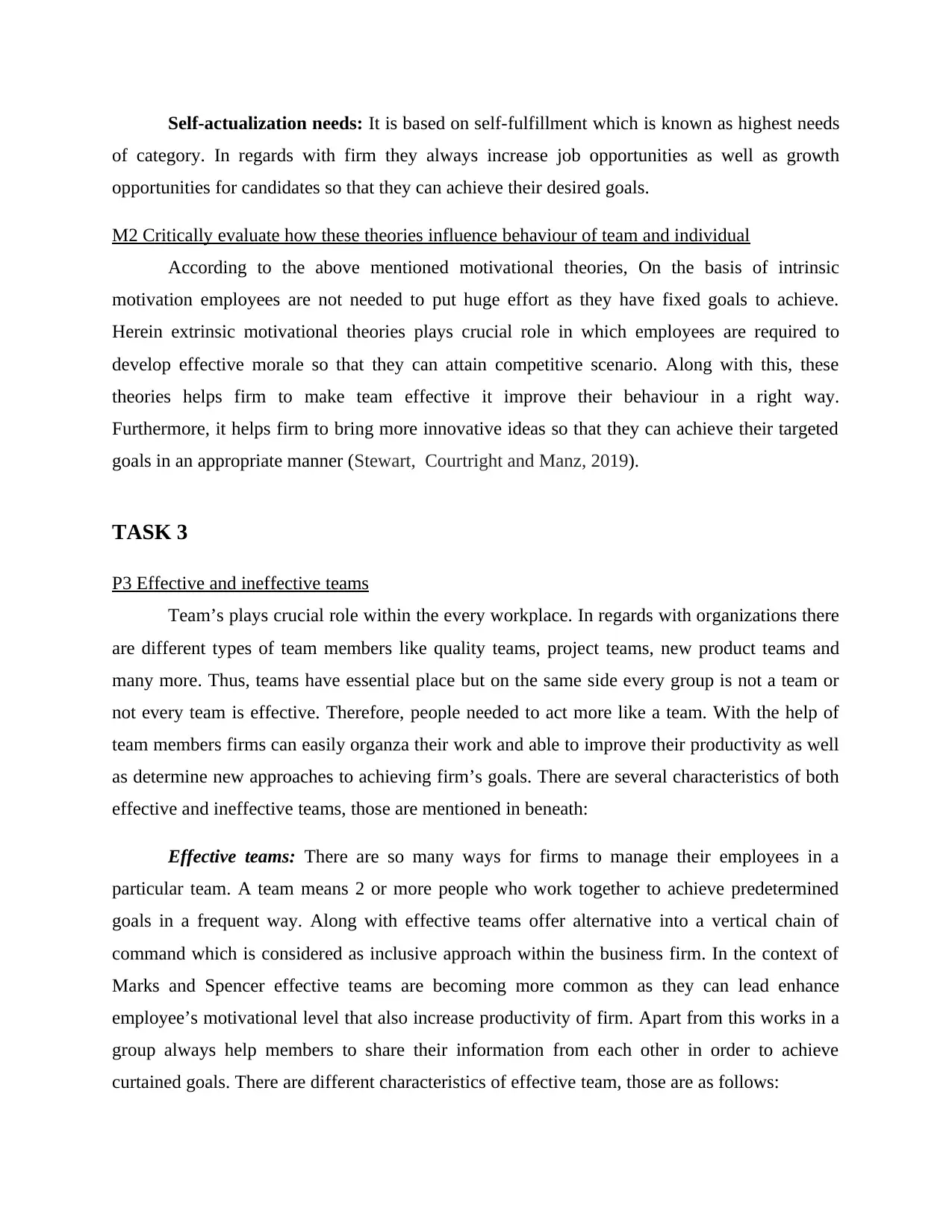
Self-actualization needs: It is based on self-fulfillment which is known as highest needs
of category. In regards with firm they always increase job opportunities as well as growth
opportunities for candidates so that they can achieve their desired goals.
M2 Critically evaluate how these theories influence behaviour of team and individual
According to the above mentioned motivational theories, On the basis of intrinsic
motivation employees are not needed to put huge effort as they have fixed goals to achieve.
Herein extrinsic motivational theories plays crucial role in which employees are required to
develop effective morale so that they can attain competitive scenario. Along with this, these
theories helps firm to make team effective it improve their behaviour in a right way.
Furthermore, it helps firm to bring more innovative ideas so that they can achieve their targeted
goals in an appropriate manner (Stewart, Courtright and Manz, 2019).
TASK 3
P3 Effective and ineffective teams
Team’s plays crucial role within the every workplace. In regards with organizations there
are different types of team members like quality teams, project teams, new product teams and
many more. Thus, teams have essential place but on the same side every group is not a team or
not every team is effective. Therefore, people needed to act more like a team. With the help of
team members firms can easily organza their work and able to improve their productivity as well
as determine new approaches to achieving firm’s goals. There are several characteristics of both
effective and ineffective teams, those are mentioned in beneath:
Effective teams: There are so many ways for firms to manage their employees in a
particular team. A team means 2 or more people who work together to achieve predetermined
goals in a frequent way. Along with effective teams offer alternative into a vertical chain of
command which is considered as inclusive approach within the business firm. In the context of
Marks and Spencer effective teams are becoming more common as they can lead enhance
employee’s motivational level that also increase productivity of firm. Apart from this works in a
group always help members to share their information from each other in order to achieve
curtained goals. There are different characteristics of effective team, those are as follows:
of category. In regards with firm they always increase job opportunities as well as growth
opportunities for candidates so that they can achieve their desired goals.
M2 Critically evaluate how these theories influence behaviour of team and individual
According to the above mentioned motivational theories, On the basis of intrinsic
motivation employees are not needed to put huge effort as they have fixed goals to achieve.
Herein extrinsic motivational theories plays crucial role in which employees are required to
develop effective morale so that they can attain competitive scenario. Along with this, these
theories helps firm to make team effective it improve their behaviour in a right way.
Furthermore, it helps firm to bring more innovative ideas so that they can achieve their targeted
goals in an appropriate manner (Stewart, Courtright and Manz, 2019).
TASK 3
P3 Effective and ineffective teams
Team’s plays crucial role within the every workplace. In regards with organizations there
are different types of team members like quality teams, project teams, new product teams and
many more. Thus, teams have essential place but on the same side every group is not a team or
not every team is effective. Therefore, people needed to act more like a team. With the help of
team members firms can easily organza their work and able to improve their productivity as well
as determine new approaches to achieving firm’s goals. There are several characteristics of both
effective and ineffective teams, those are mentioned in beneath:
Effective teams: There are so many ways for firms to manage their employees in a
particular team. A team means 2 or more people who work together to achieve predetermined
goals in a frequent way. Along with effective teams offer alternative into a vertical chain of
command which is considered as inclusive approach within the business firm. In the context of
Marks and Spencer effective teams are becoming more common as they can lead enhance
employee’s motivational level that also increase productivity of firm. Apart from this works in a
group always help members to share their information from each other in order to achieve
curtained goals. There are different characteristics of effective team, those are as follows:
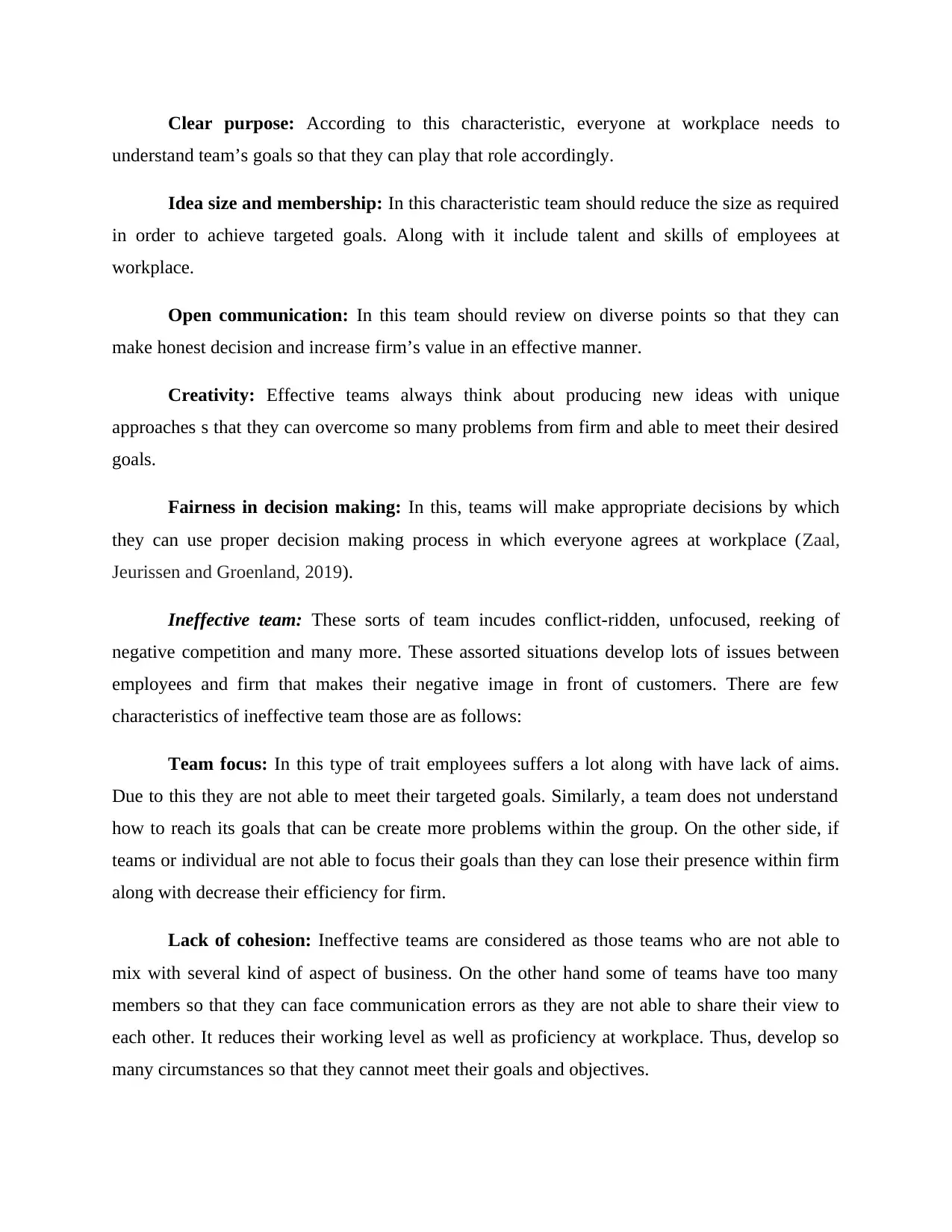
Clear purpose: According to this characteristic, everyone at workplace needs to
understand team’s goals so that they can play that role accordingly.
Idea size and membership: In this characteristic team should reduce the size as required
in order to achieve targeted goals. Along with it include talent and skills of employees at
workplace.
Open communication: In this team should review on diverse points so that they can
make honest decision and increase firm’s value in an effective manner.
Creativity: Effective teams always think about producing new ideas with unique
approaches s that they can overcome so many problems from firm and able to meet their desired
goals.
Fairness in decision making: In this, teams will make appropriate decisions by which
they can use proper decision making process in which everyone agrees at workplace (Zaal,
Jeurissen and Groenland, 2019).
Ineffective team: These sorts of team incudes conflict-ridden, unfocused, reeking of
negative competition and many more. These assorted situations develop lots of issues between
employees and firm that makes their negative image in front of customers. There are few
characteristics of ineffective team those are as follows:
Team focus: In this type of trait employees suffers a lot along with have lack of aims.
Due to this they are not able to meet their targeted goals. Similarly, a team does not understand
how to reach its goals that can be create more problems within the group. On the other side, if
teams or individual are not able to focus their goals than they can lose their presence within firm
along with decrease their efficiency for firm.
Lack of cohesion: Ineffective teams are considered as those teams who are not able to
mix with several kind of aspect of business. On the other hand some of teams have too many
members so that they can face communication errors as they are not able to share their view to
each other. It reduces their working level as well as proficiency at workplace. Thus, develop so
many circumstances so that they cannot meet their goals and objectives.
understand team’s goals so that they can play that role accordingly.
Idea size and membership: In this characteristic team should reduce the size as required
in order to achieve targeted goals. Along with it include talent and skills of employees at
workplace.
Open communication: In this team should review on diverse points so that they can
make honest decision and increase firm’s value in an effective manner.
Creativity: Effective teams always think about producing new ideas with unique
approaches s that they can overcome so many problems from firm and able to meet their desired
goals.
Fairness in decision making: In this, teams will make appropriate decisions by which
they can use proper decision making process in which everyone agrees at workplace (Zaal,
Jeurissen and Groenland, 2019).
Ineffective team: These sorts of team incudes conflict-ridden, unfocused, reeking of
negative competition and many more. These assorted situations develop lots of issues between
employees and firm that makes their negative image in front of customers. There are few
characteristics of ineffective team those are as follows:
Team focus: In this type of trait employees suffers a lot along with have lack of aims.
Due to this they are not able to meet their targeted goals. Similarly, a team does not understand
how to reach its goals that can be create more problems within the group. On the other side, if
teams or individual are not able to focus their goals than they can lose their presence within firm
along with decrease their efficiency for firm.
Lack of cohesion: Ineffective teams are considered as those teams who are not able to
mix with several kind of aspect of business. On the other hand some of teams have too many
members so that they can face communication errors as they are not able to share their view to
each other. It reduces their working level as well as proficiency at workplace. Thus, develop so
many circumstances so that they cannot meet their goals and objectives.
Secure Best Marks with AI Grader
Need help grading? Try our AI Grader for instant feedback on your assignments.
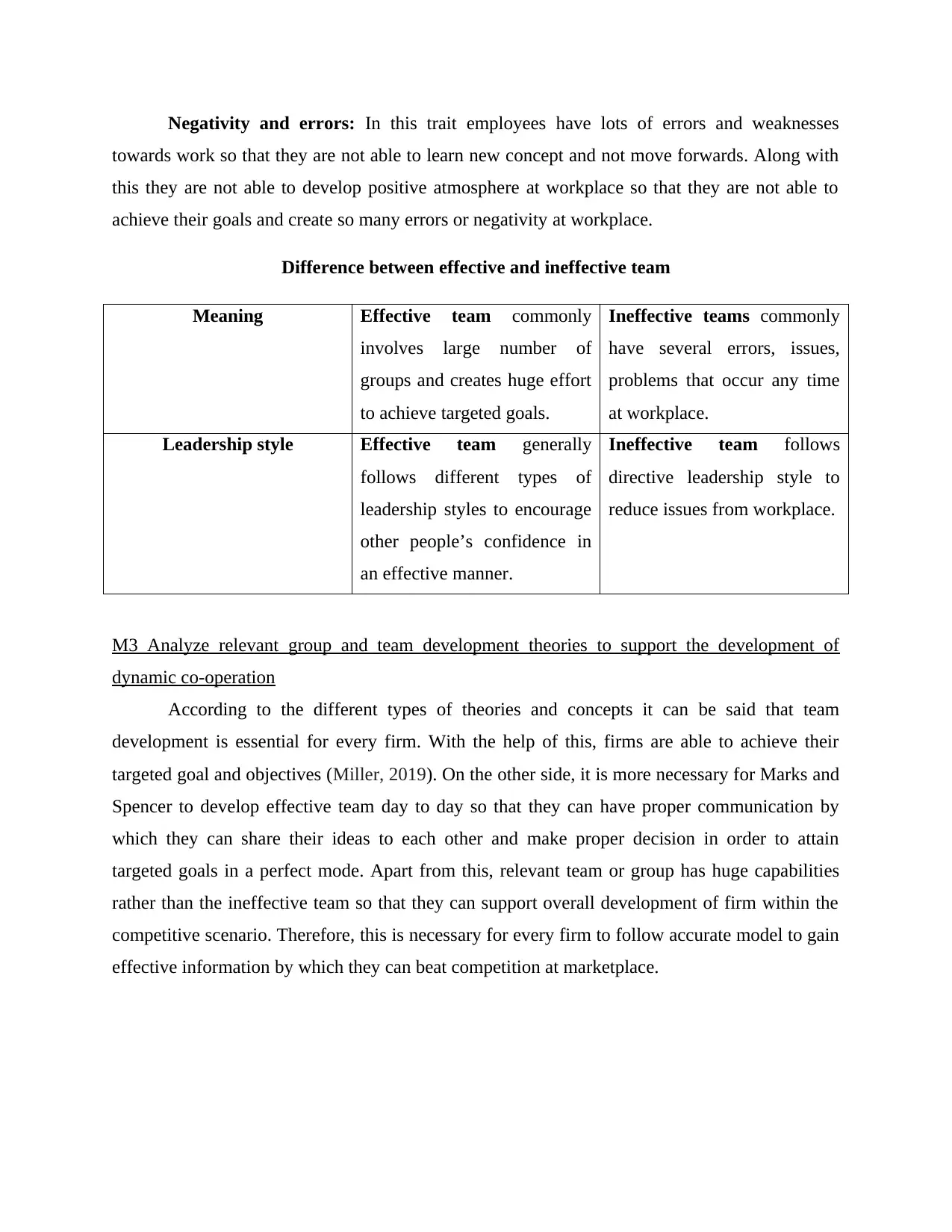
Negativity and errors: In this trait employees have lots of errors and weaknesses
towards work so that they are not able to learn new concept and not move forwards. Along with
this they are not able to develop positive atmosphere at workplace so that they are not able to
achieve their goals and create so many errors or negativity at workplace.
Difference between effective and ineffective team
Meaning Effective team commonly
involves large number of
groups and creates huge effort
to achieve targeted goals.
Ineffective teams commonly
have several errors, issues,
problems that occur any time
at workplace.
Leadership style Effective team generally
follows different types of
leadership styles to encourage
other people’s confidence in
an effective manner.
Ineffective team follows
directive leadership style to
reduce issues from workplace.
M3 Analyze relevant group and team development theories to support the development of
dynamic co-operation
According to the different types of theories and concepts it can be said that team
development is essential for every firm. With the help of this, firms are able to achieve their
targeted goal and objectives (Miller, 2019). On the other side, it is more necessary for Marks and
Spencer to develop effective team day to day so that they can have proper communication by
which they can share their ideas to each other and make proper decision in order to attain
targeted goals in a perfect mode. Apart from this, relevant team or group has huge capabilities
rather than the ineffective team so that they can support overall development of firm within the
competitive scenario. Therefore, this is necessary for every firm to follow accurate model to gain
effective information by which they can beat competition at marketplace.
towards work so that they are not able to learn new concept and not move forwards. Along with
this they are not able to develop positive atmosphere at workplace so that they are not able to
achieve their goals and create so many errors or negativity at workplace.
Difference between effective and ineffective team
Meaning Effective team commonly
involves large number of
groups and creates huge effort
to achieve targeted goals.
Ineffective teams commonly
have several errors, issues,
problems that occur any time
at workplace.
Leadership style Effective team generally
follows different types of
leadership styles to encourage
other people’s confidence in
an effective manner.
Ineffective team follows
directive leadership style to
reduce issues from workplace.
M3 Analyze relevant group and team development theories to support the development of
dynamic co-operation
According to the different types of theories and concepts it can be said that team
development is essential for every firm. With the help of this, firms are able to achieve their
targeted goal and objectives (Miller, 2019). On the other side, it is more necessary for Marks and
Spencer to develop effective team day to day so that they can have proper communication by
which they can share their ideas to each other and make proper decision in order to attain
targeted goals in a perfect mode. Apart from this, relevant team or group has huge capabilities
rather than the ineffective team so that they can support overall development of firm within the
competitive scenario. Therefore, this is necessary for every firm to follow accurate model to gain
effective information by which they can beat competition at marketplace.
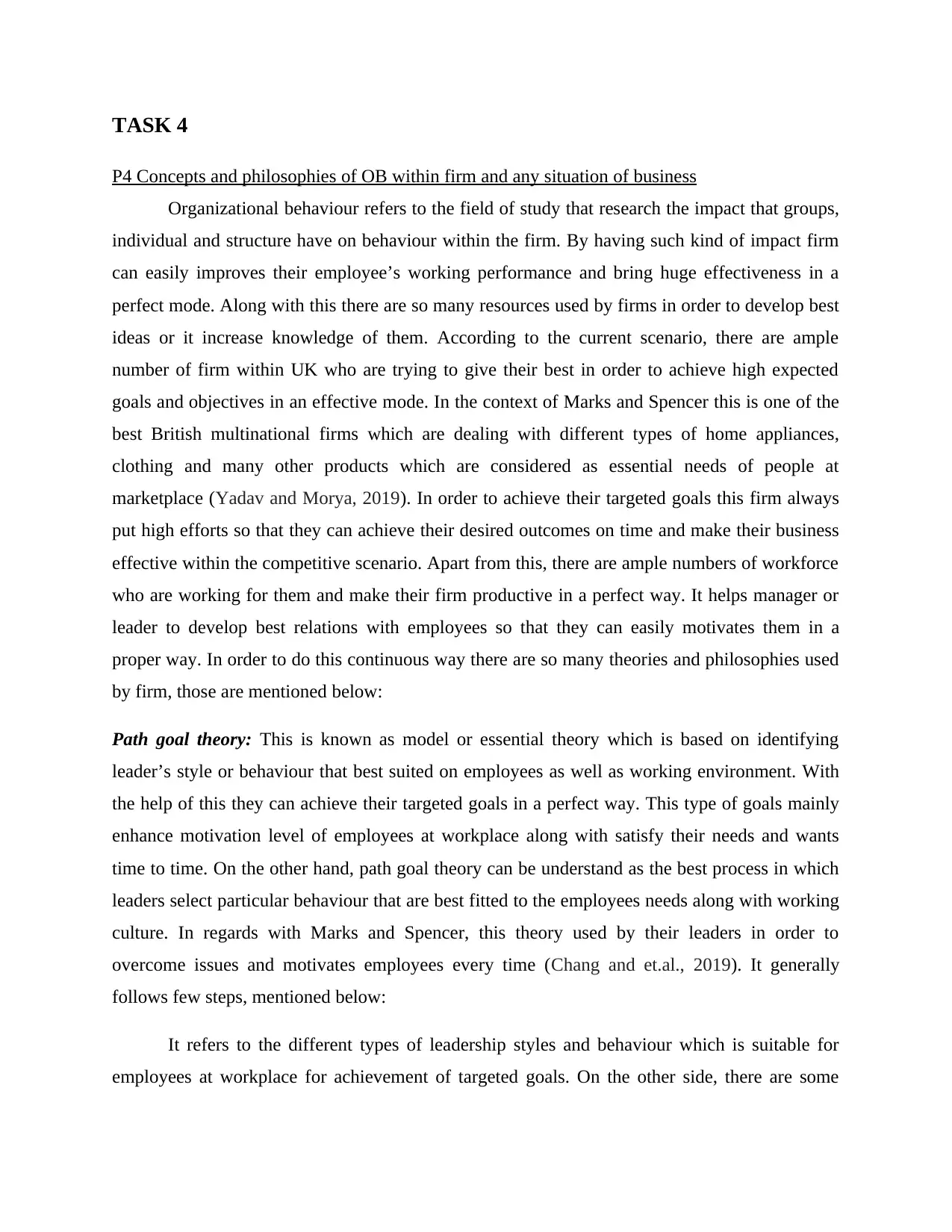
TASK 4
P4 Concepts and philosophies of OB within firm and any situation of business
Organizational behaviour refers to the field of study that research the impact that groups,
individual and structure have on behaviour within the firm. By having such kind of impact firm
can easily improves their employee’s working performance and bring huge effectiveness in a
perfect mode. Along with this there are so many resources used by firms in order to develop best
ideas or it increase knowledge of them. According to the current scenario, there are ample
number of firm within UK who are trying to give their best in order to achieve high expected
goals and objectives in an effective mode. In the context of Marks and Spencer this is one of the
best British multinational firms which are dealing with different types of home appliances,
clothing and many other products which are considered as essential needs of people at
marketplace (Yadav and Morya, 2019). In order to achieve their targeted goals this firm always
put high efforts so that they can achieve their desired outcomes on time and make their business
effective within the competitive scenario. Apart from this, there are ample numbers of workforce
who are working for them and make their firm productive in a perfect way. It helps manager or
leader to develop best relations with employees so that they can easily motivates them in a
proper way. In order to do this continuous way there are so many theories and philosophies used
by firm, those are mentioned below:
Path goal theory: This is known as model or essential theory which is based on identifying
leader’s style or behaviour that best suited on employees as well as working environment. With
the help of this they can achieve their targeted goals in a perfect way. This type of goals mainly
enhance motivation level of employees at workplace along with satisfy their needs and wants
time to time. On the other hand, path goal theory can be understand as the best process in which
leaders select particular behaviour that are best fitted to the employees needs along with working
culture. In regards with Marks and Spencer, this theory used by their leaders in order to
overcome issues and motivates employees every time (Chang and et.al., 2019). It generally
follows few steps, mentioned below:
It refers to the different types of leadership styles and behaviour which is suitable for
employees at workplace for achievement of targeted goals. On the other side, there are some
P4 Concepts and philosophies of OB within firm and any situation of business
Organizational behaviour refers to the field of study that research the impact that groups,
individual and structure have on behaviour within the firm. By having such kind of impact firm
can easily improves their employee’s working performance and bring huge effectiveness in a
perfect mode. Along with this there are so many resources used by firms in order to develop best
ideas or it increase knowledge of them. According to the current scenario, there are ample
number of firm within UK who are trying to give their best in order to achieve high expected
goals and objectives in an effective mode. In the context of Marks and Spencer this is one of the
best British multinational firms which are dealing with different types of home appliances,
clothing and many other products which are considered as essential needs of people at
marketplace (Yadav and Morya, 2019). In order to achieve their targeted goals this firm always
put high efforts so that they can achieve their desired outcomes on time and make their business
effective within the competitive scenario. Apart from this, there are ample numbers of workforce
who are working for them and make their firm productive in a perfect way. It helps manager or
leader to develop best relations with employees so that they can easily motivates them in a
proper way. In order to do this continuous way there are so many theories and philosophies used
by firm, those are mentioned below:
Path goal theory: This is known as model or essential theory which is based on identifying
leader’s style or behaviour that best suited on employees as well as working environment. With
the help of this they can achieve their targeted goals in a perfect way. This type of goals mainly
enhance motivation level of employees at workplace along with satisfy their needs and wants
time to time. On the other hand, path goal theory can be understand as the best process in which
leaders select particular behaviour that are best fitted to the employees needs along with working
culture. In regards with Marks and Spencer, this theory used by their leaders in order to
overcome issues and motivates employees every time (Chang and et.al., 2019). It generally
follows few steps, mentioned below:
It refers to the different types of leadership styles and behaviour which is suitable for
employees at workplace for achievement of targeted goals. On the other side, there are some
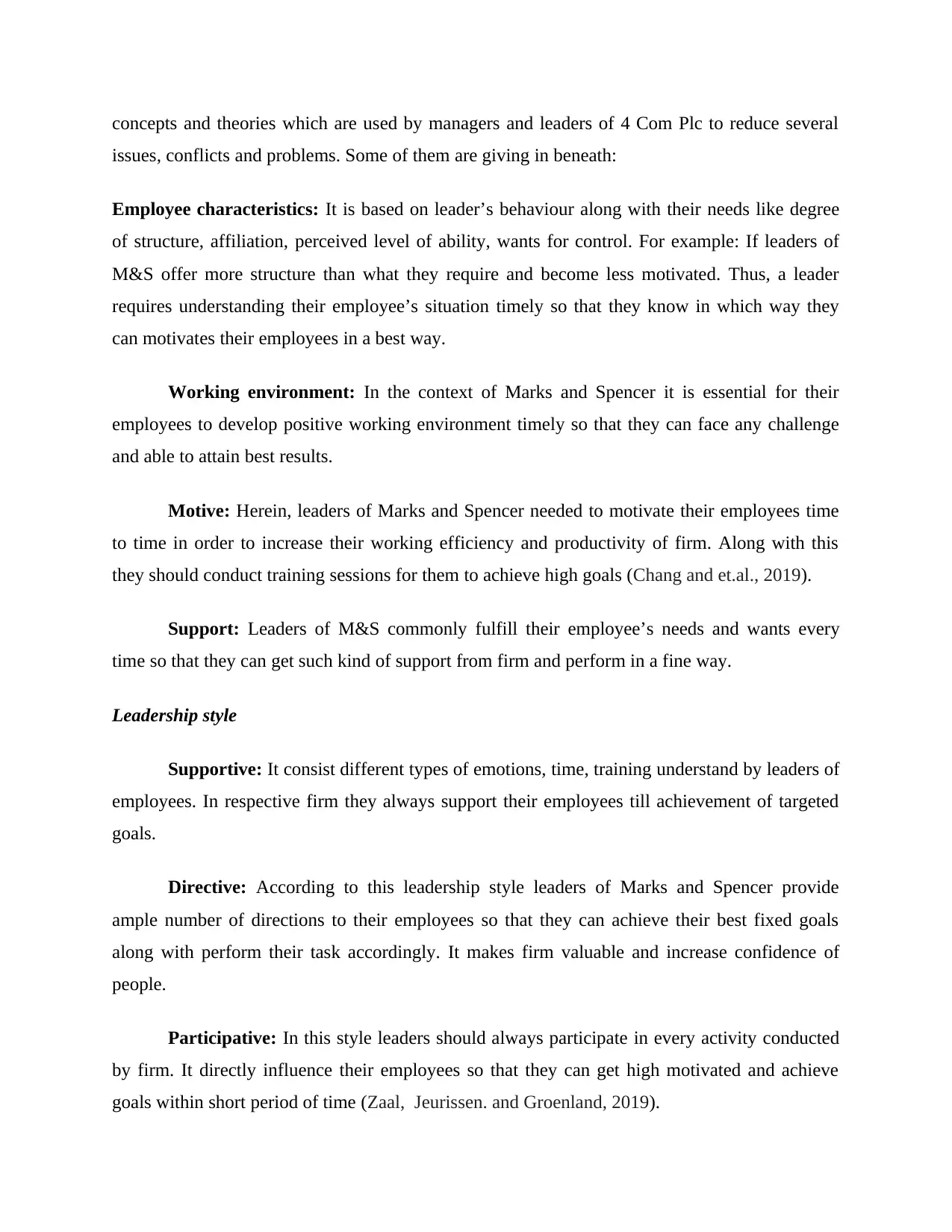
concepts and theories which are used by managers and leaders of 4 Com Plc to reduce several
issues, conflicts and problems. Some of them are giving in beneath:
Employee characteristics: It is based on leader’s behaviour along with their needs like degree
of structure, affiliation, perceived level of ability, wants for control. For example: If leaders of
M&S offer more structure than what they require and become less motivated. Thus, a leader
requires understanding their employee’s situation timely so that they know in which way they
can motivates their employees in a best way.
Working environment: In the context of Marks and Spencer it is essential for their
employees to develop positive working environment timely so that they can face any challenge
and able to attain best results.
Motive: Herein, leaders of Marks and Spencer needed to motivate their employees time
to time in order to increase their working efficiency and productivity of firm. Along with this
they should conduct training sessions for them to achieve high goals (Chang and et.al., 2019).
Support: Leaders of M&S commonly fulfill their employee’s needs and wants every
time so that they can get such kind of support from firm and perform in a fine way.
Leadership style
Supportive: It consist different types of emotions, time, training understand by leaders of
employees. In respective firm they always support their employees till achievement of targeted
goals.
Directive: According to this leadership style leaders of Marks and Spencer provide
ample number of directions to their employees so that they can achieve their best fixed goals
along with perform their task accordingly. It makes firm valuable and increase confidence of
people.
Participative: In this style leaders should always participate in every activity conducted
by firm. It directly influence their employees so that they can get high motivated and achieve
goals within short period of time (Zaal, Jeurissen. and Groenland, 2019).
issues, conflicts and problems. Some of them are giving in beneath:
Employee characteristics: It is based on leader’s behaviour along with their needs like degree
of structure, affiliation, perceived level of ability, wants for control. For example: If leaders of
M&S offer more structure than what they require and become less motivated. Thus, a leader
requires understanding their employee’s situation timely so that they know in which way they
can motivates their employees in a best way.
Working environment: In the context of Marks and Spencer it is essential for their
employees to develop positive working environment timely so that they can face any challenge
and able to attain best results.
Motive: Herein, leaders of Marks and Spencer needed to motivate their employees time
to time in order to increase their working efficiency and productivity of firm. Along with this
they should conduct training sessions for them to achieve high goals (Chang and et.al., 2019).
Support: Leaders of M&S commonly fulfill their employee’s needs and wants every
time so that they can get such kind of support from firm and perform in a fine way.
Leadership style
Supportive: It consist different types of emotions, time, training understand by leaders of
employees. In respective firm they always support their employees till achievement of targeted
goals.
Directive: According to this leadership style leaders of Marks and Spencer provide
ample number of directions to their employees so that they can achieve their best fixed goals
along with perform their task accordingly. It makes firm valuable and increase confidence of
people.
Participative: In this style leaders should always participate in every activity conducted
by firm. It directly influence their employees so that they can get high motivated and achieve
goals within short period of time (Zaal, Jeurissen. and Groenland, 2019).
Paraphrase This Document
Need a fresh take? Get an instant paraphrase of this document with our AI Paraphraser
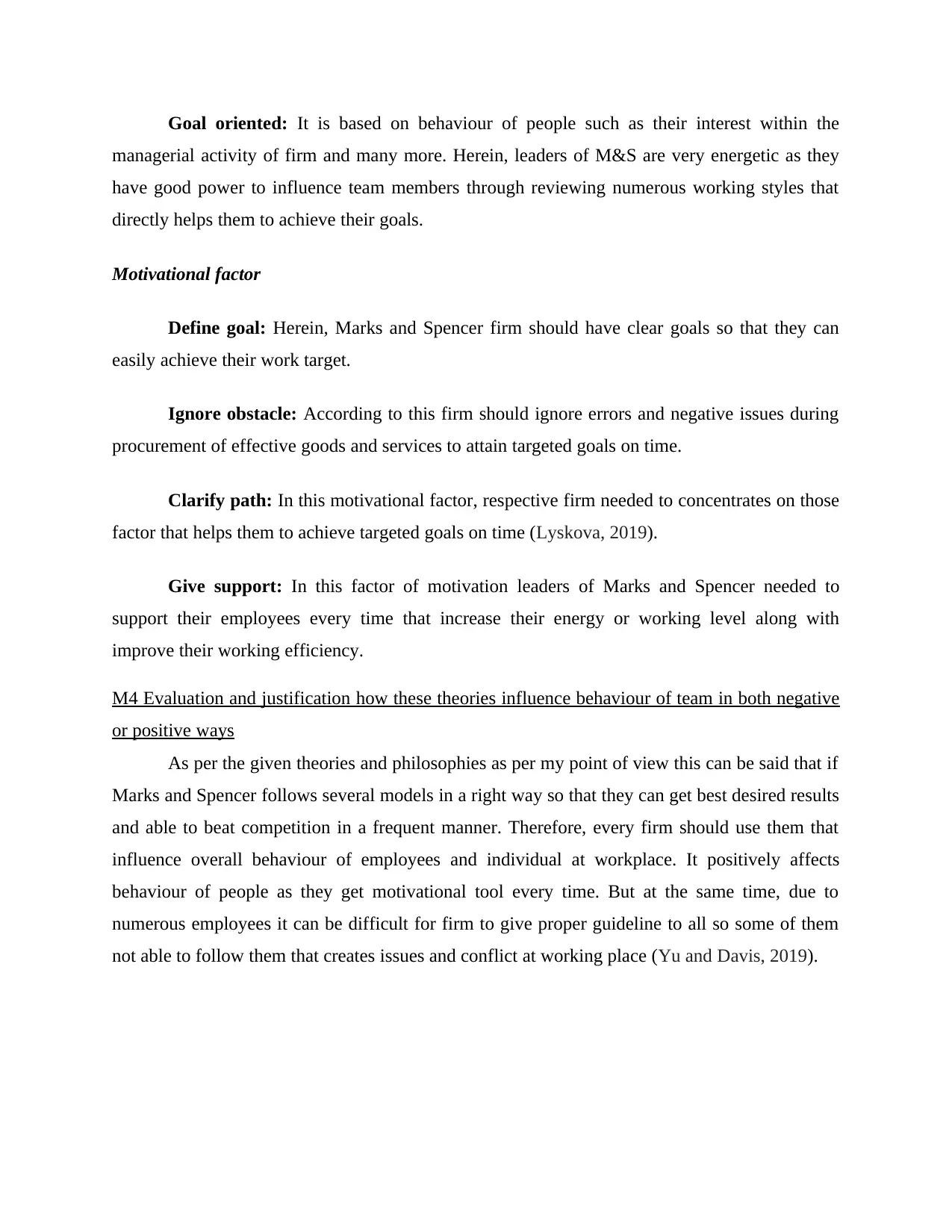
Goal oriented: It is based on behaviour of people such as their interest within the
managerial activity of firm and many more. Herein, leaders of M&S are very energetic as they
have good power to influence team members through reviewing numerous working styles that
directly helps them to achieve their goals.
Motivational factor
Define goal: Herein, Marks and Spencer firm should have clear goals so that they can
easily achieve their work target.
Ignore obstacle: According to this firm should ignore errors and negative issues during
procurement of effective goods and services to attain targeted goals on time.
Clarify path: In this motivational factor, respective firm needed to concentrates on those
factor that helps them to achieve targeted goals on time (Lyskova, 2019).
Give support: In this factor of motivation leaders of Marks and Spencer needed to
support their employees every time that increase their energy or working level along with
improve their working efficiency.
M4 Evaluation and justification how these theories influence behaviour of team in both negative
or positive ways
As per the given theories and philosophies as per my point of view this can be said that if
Marks and Spencer follows several models in a right way so that they can get best desired results
and able to beat competition in a frequent manner. Therefore, every firm should use them that
influence overall behaviour of employees and individual at workplace. It positively affects
behaviour of people as they get motivational tool every time. But at the same time, due to
numerous employees it can be difficult for firm to give proper guideline to all so some of them
not able to follow them that creates issues and conflict at working place (Yu and Davis, 2019).
managerial activity of firm and many more. Herein, leaders of M&S are very energetic as they
have good power to influence team members through reviewing numerous working styles that
directly helps them to achieve their goals.
Motivational factor
Define goal: Herein, Marks and Spencer firm should have clear goals so that they can
easily achieve their work target.
Ignore obstacle: According to this firm should ignore errors and negative issues during
procurement of effective goods and services to attain targeted goals on time.
Clarify path: In this motivational factor, respective firm needed to concentrates on those
factor that helps them to achieve targeted goals on time (Lyskova, 2019).
Give support: In this factor of motivation leaders of Marks and Spencer needed to
support their employees every time that increase their energy or working level along with
improve their working efficiency.
M4 Evaluation and justification how these theories influence behaviour of team in both negative
or positive ways
As per the given theories and philosophies as per my point of view this can be said that if
Marks and Spencer follows several models in a right way so that they can get best desired results
and able to beat competition in a frequent manner. Therefore, every firm should use them that
influence overall behaviour of employees and individual at workplace. It positively affects
behaviour of people as they get motivational tool every time. But at the same time, due to
numerous employees it can be difficult for firm to give proper guideline to all so some of them
not able to follow them that creates issues and conflict at working place (Yu and Davis, 2019).
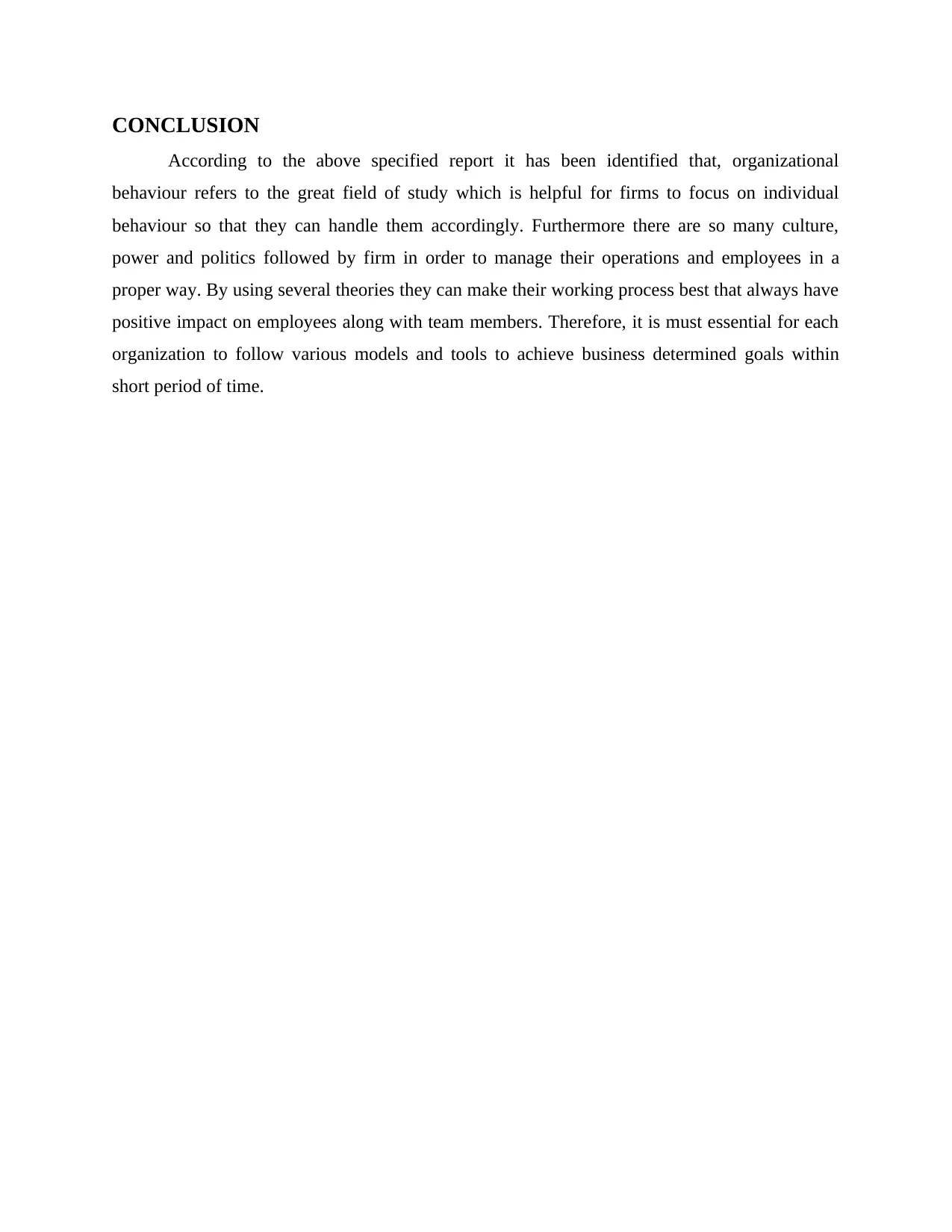
CONCLUSION
According to the above specified report it has been identified that, organizational
behaviour refers to the great field of study which is helpful for firms to focus on individual
behaviour so that they can handle them accordingly. Furthermore there are so many culture,
power and politics followed by firm in order to manage their operations and employees in a
proper way. By using several theories they can make their working process best that always have
positive impact on employees along with team members. Therefore, it is must essential for each
organization to follow various models and tools to achieve business determined goals within
short period of time.
According to the above specified report it has been identified that, organizational
behaviour refers to the great field of study which is helpful for firms to focus on individual
behaviour so that they can handle them accordingly. Furthermore there are so many culture,
power and politics followed by firm in order to manage their operations and employees in a
proper way. By using several theories they can make their working process best that always have
positive impact on employees along with team members. Therefore, it is must essential for each
organization to follow various models and tools to achieve business determined goals within
short period of time.
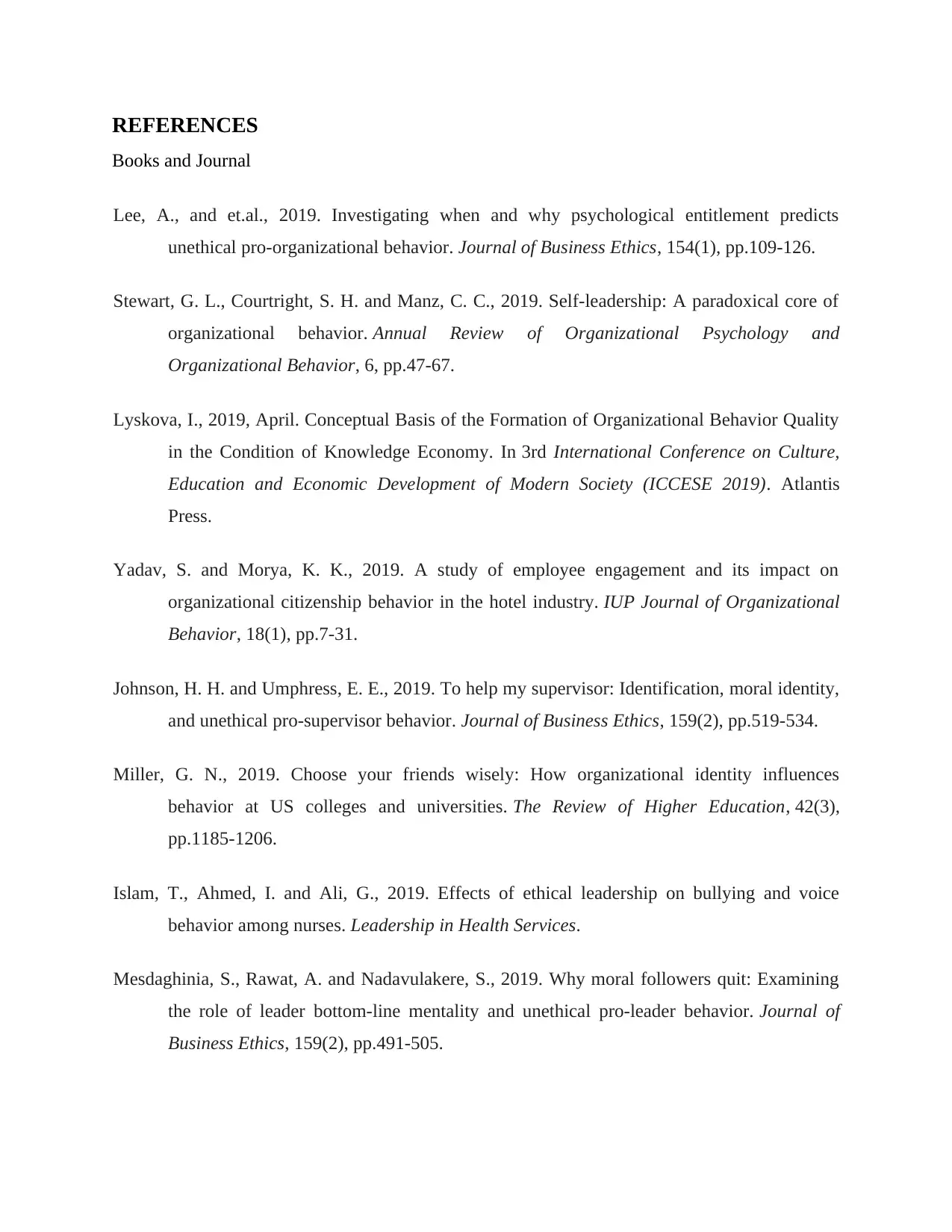
REFERENCES
Books and Journal
Lee, A., and et.al., 2019. Investigating when and why psychological entitlement predicts
unethical pro-organizational behavior. Journal of Business Ethics, 154(1), pp.109-126.
Stewart, G. L., Courtright, S. H. and Manz, C. C., 2019. Self-leadership: A paradoxical core of
organizational behavior. Annual Review of Organizational Psychology and
Organizational Behavior, 6, pp.47-67.
Lyskova, I., 2019, April. Conceptual Basis of the Formation of Organizational Behavior Quality
in the Condition of Knowledge Economy. In 3rd International Conference on Culture,
Education and Economic Development of Modern Society (ICCESE 2019). Atlantis
Press.
Yadav, S. and Morya, K. K., 2019. A study of employee engagement and its impact on
organizational citizenship behavior in the hotel industry. IUP Journal of Organizational
Behavior, 18(1), pp.7-31.
Johnson, H. H. and Umphress, E. E., 2019. To help my supervisor: Identification, moral identity,
and unethical pro-supervisor behavior. Journal of Business Ethics, 159(2), pp.519-534.
Miller, G. N., 2019. Choose your friends wisely: How organizational identity influences
behavior at US colleges and universities. The Review of Higher Education, 42(3),
pp.1185-1206.
Islam, T., Ahmed, I. and Ali, G., 2019. Effects of ethical leadership on bullying and voice
behavior among nurses. Leadership in Health Services.
Mesdaghinia, S., Rawat, A. and Nadavulakere, S., 2019. Why moral followers quit: Examining
the role of leader bottom-line mentality and unethical pro-leader behavior. Journal of
Business Ethics, 159(2), pp.491-505.
Books and Journal
Lee, A., and et.al., 2019. Investigating when and why psychological entitlement predicts
unethical pro-organizational behavior. Journal of Business Ethics, 154(1), pp.109-126.
Stewart, G. L., Courtright, S. H. and Manz, C. C., 2019. Self-leadership: A paradoxical core of
organizational behavior. Annual Review of Organizational Psychology and
Organizational Behavior, 6, pp.47-67.
Lyskova, I., 2019, April. Conceptual Basis of the Formation of Organizational Behavior Quality
in the Condition of Knowledge Economy. In 3rd International Conference on Culture,
Education and Economic Development of Modern Society (ICCESE 2019). Atlantis
Press.
Yadav, S. and Morya, K. K., 2019. A study of employee engagement and its impact on
organizational citizenship behavior in the hotel industry. IUP Journal of Organizational
Behavior, 18(1), pp.7-31.
Johnson, H. H. and Umphress, E. E., 2019. To help my supervisor: Identification, moral identity,
and unethical pro-supervisor behavior. Journal of Business Ethics, 159(2), pp.519-534.
Miller, G. N., 2019. Choose your friends wisely: How organizational identity influences
behavior at US colleges and universities. The Review of Higher Education, 42(3),
pp.1185-1206.
Islam, T., Ahmed, I. and Ali, G., 2019. Effects of ethical leadership on bullying and voice
behavior among nurses. Leadership in Health Services.
Mesdaghinia, S., Rawat, A. and Nadavulakere, S., 2019. Why moral followers quit: Examining
the role of leader bottom-line mentality and unethical pro-leader behavior. Journal of
Business Ethics, 159(2), pp.491-505.
Secure Best Marks with AI Grader
Need help grading? Try our AI Grader for instant feedback on your assignments.
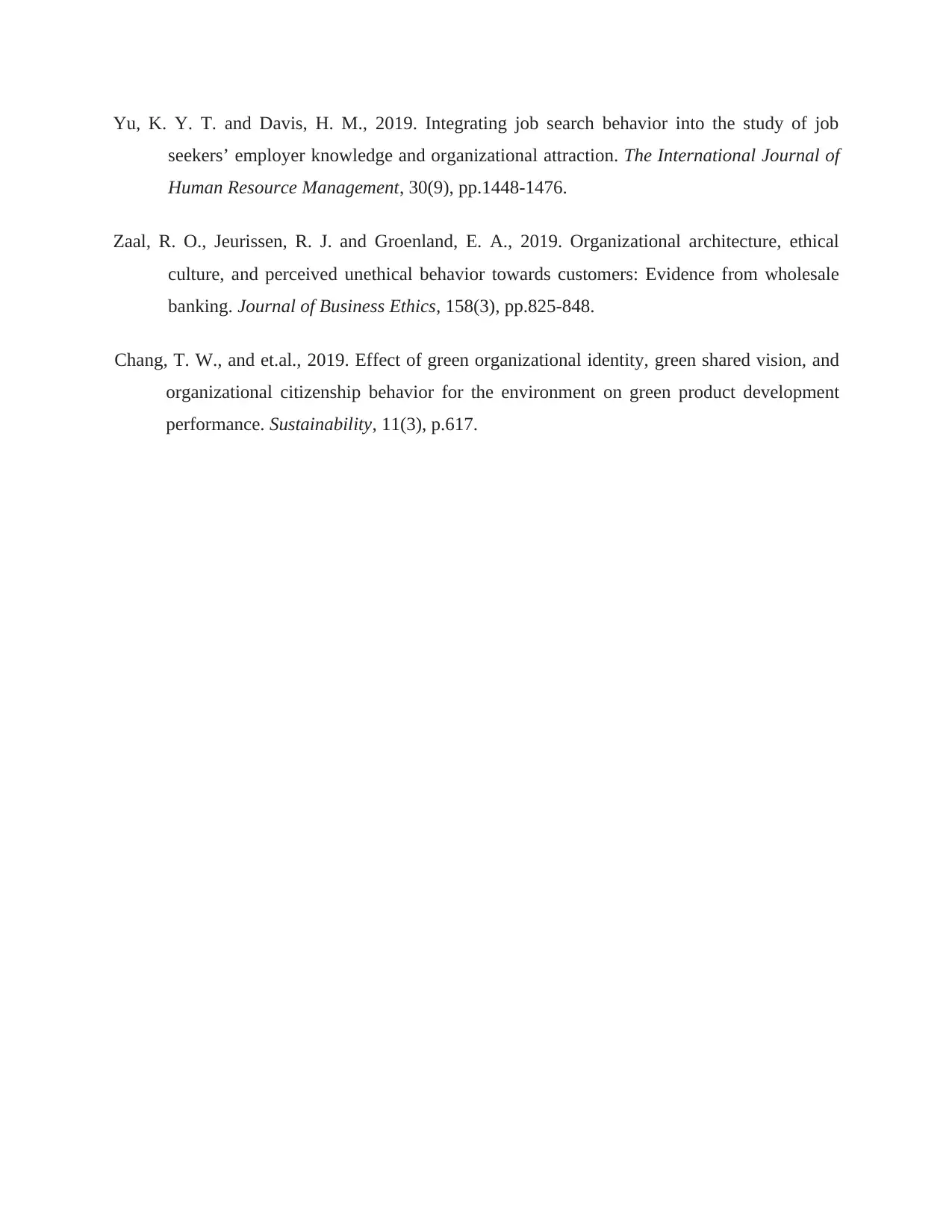
Yu, K. Y. T. and Davis, H. M., 2019. Integrating job search behavior into the study of job
seekers’ employer knowledge and organizational attraction. The International Journal of
Human Resource Management, 30(9), pp.1448-1476.
Zaal, R. O., Jeurissen, R. J. and Groenland, E. A., 2019. Organizational architecture, ethical
culture, and perceived unethical behavior towards customers: Evidence from wholesale
banking. Journal of Business Ethics, 158(3), pp.825-848.
Chang, T. W., and et.al., 2019. Effect of green organizational identity, green shared vision, and
organizational citizenship behavior for the environment on green product development
performance. Sustainability, 11(3), p.617.
seekers’ employer knowledge and organizational attraction. The International Journal of
Human Resource Management, 30(9), pp.1448-1476.
Zaal, R. O., Jeurissen, R. J. and Groenland, E. A., 2019. Organizational architecture, ethical
culture, and perceived unethical behavior towards customers: Evidence from wholesale
banking. Journal of Business Ethics, 158(3), pp.825-848.
Chang, T. W., and et.al., 2019. Effect of green organizational identity, green shared vision, and
organizational citizenship behavior for the environment on green product development
performance. Sustainability, 11(3), p.617.
1 out of 17
![[object Object]](/_next/static/media/star-bottom.7253800d.svg)




